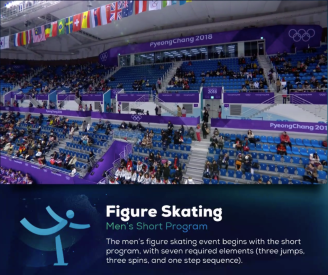Last week’s inauguration of the Pyeongchang 2018 Winter Olympics had thousands of Americans tuning into NBC Sport’s coverage of the Games in Pyeongchang, South Korea. NBC, who has a monopoly on U.S. broadcasting rights to the Olympics, has instructed its announcers to follow an incorrect pronunciation of the host city ‘s name because, according to chairman of NBC Broadcasting and Sports Mark Lazarus, it sounds “cleaner.” NBC’s insistence on the altered pronunciation and the lack of serious repercussions from its continued use reflect white neoimperial attitudes of self-imposed authority on issues of cultural difference, and the privileges reserved for white voices that simultaneously racialize and appropriate aspects of ethnic language and culture.
NBC’s ‘official’ pronunciation of the name “Pyeongchang” is “Pyung-chayng,” with the last syllable rhyming with “lang,” as in “language.” Yet back in December, NBC Boston’s Young-Jin Kim had narrated a video by NBC Washington titled “Pyeongchang Winter Olympics Venue Pronunciation Guide” in which he demonstrated the correct pronounciation, “Pyung-chahng.” Recently, the Asian American Journalists Association (AAJA) released a video featuring CeFaan Kim, co-chair of AAJA MediaWatch, who affirmed the “Pyung-chahng” pronunciation (originally reported in this article by The Washington Post).

Pyeongchang is not the only victim of careless mispronunciation by NBC announcers. Throughout their stream of the Men’s Figure Skating Short Program, announcer Chris Vosters can be heard introducing Japanese skater Shoma Uno as “Shona Umo” (at 4:32:30) and Asian American Team USA skater Vincent Zhou on multiple occasions as Vincent “Zhao” (0:22:50, 0:28:50), and on occasion, “Zhu,” even as a MC at the arena could be heard in the background correctly pronouncing “Zhou.” Yet when discussing Misha Ge of Uzbekistan, Vosters takes care to say “Gee” instead of the incorrect “Geh.”

NBC’s blatant lack of respect for the Asian language reflects white neoimperial attitudes of superiority on points of cultural difference that also mark Western appropriation of Asian cuisine, in which Asian flavors are selected, altered, and “elevated” to appeal to the white palate. Just as “fusion” cuisine represents palatable exoticism, Americanized pronunciations of Pyeongchang and these skaters’ names reflect a white hegemonic characterization of Asian immigrants and Asian Americans as pervasive and foreign even as they contribute flavor to the self-ascribed multicultural “melting pot” of the United States. Although NBC has received social media backlash and bad publicity for their decision to mispronounce Pyeongchang, the lack of serious repercussions for their actions demonstrates the presence of a larger, pervasive white privilege and hegemonic authority over language. White individuals can travel to Asia, mispronounce a few token Asian words, and be praised as “charming,” “cultured,” and “open-minded,” yet when Asians speak English with an accent they are mocked and told to “speak English, this is America.”
Lazarus’s statement that NBC’s pronunciation is “cleaner” reflects a racialization of Asian bodies that perpetually characterizes them as pervasive and unwelcome. Madhavi Mallapragada critically evaluates implications of the racialization of curry, specifically its smell, in her essay “Curry As Code: Food, Race, and Technology.” She argues for curry as a “code that illuminates a larger picture about belonging and exclusion for immigrants in the United States” (Mallapragada 274). Just as “representation of Indian curry as stinky food … link[s] the ‘overwhelming’ and ‘unpleasant’ smell of curry with the ‘unwanted’ presence of Indian immigrants” (Mallapragada 263), so too does racialization of spoken language, with its unfamiliar tones, syllables, and cadence, reflect the outsider status of the ‘foreign’ unassimilated Asian or Asian American body.
As NBC announcers butcher Asian words, they exercise white hegemonic authority over spoken language, exemplifying imperialist attitudes of superiority that manifest in a disregard for Asian bodies—a feeling of lack of obligation to respect Asian language and cultural histories that is not present in discussions of Western identities. Racialization depicts Asian bodies as offensive to the senses, and recognition of this practice permits elucidation of a greater narrative of disparity in authority over spoken language, and covert discourse of Asian immigrants and Asian Americans as a foreign and unwelcome presence in white spaces.
Sources:
Mallapragada, Madhavi . “Curry As Code: Food, Race, and Technology.” Global Asian American Popular Cultures, edited by Shilpa Davé, Leilani Nishime, Tasha Oren, New York University Press, 2016, 263-275.